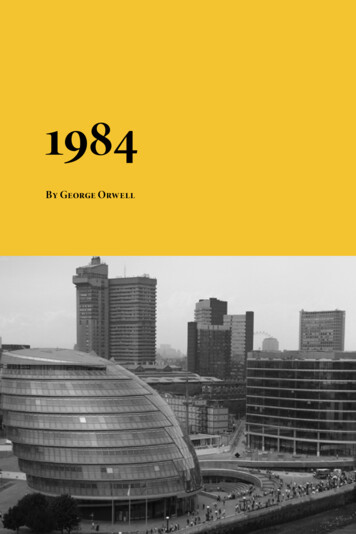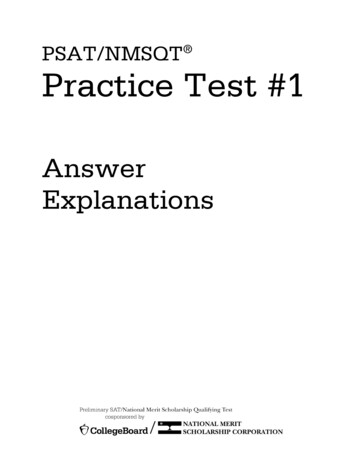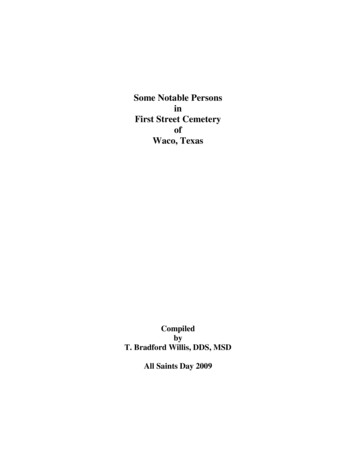
Transcription
EmmaJane AustenThis eBook is designed and published by Planet PDF. For more freeeBooks visit our Web site at http://www.planetpdf.com
EmmaVolume I2 of 745
EmmaChapter IEmma Woodhouse, handsome, clever, and rich, with acomfortable home and happy disposition, seemed to unitesome of the best blessings of existence; and had livednearly twenty-one years in the world with very little todistress or vex her.She was the youngest of the two daughters of a mostaffectionate, indulgent father; and had, in consequence ofher sister’s marriage, been mistress of his house from a veryearly period. Her mother had died too long ago for her tohave more than an indistinct remembrance of her caresses;and her place had been supplied by an excellent woman asgoverness, who had fallen little short of a mother inaffection.Sixteen years had Miss Taylor been in Mr.Woodhouse’s family, less as a governess than a friend, veryfond of both daughters, but particularly of Emma.Between them it was more the intimacy of sisters. Evenbefore Miss Taylor had ceased to hold the nominal officeof governess, the mildness of her temper had hardlyallowed her to impose any restraint; and the shadow ofauthority being now long passed away, they had beenliving together as friend and friend very mutually attached,3 of 745
Emmaand Emma doing just what she liked; highly esteemingMiss Taylor’s judgment, but directed chiefly by her own.The real evils, indeed, of Emma’s situation were thepower of having rather too much her own way, and adisposition to think a little too well of herself; these werethe disadvantages which threatened alloy to her manyenjoyments. The danger, however, was at present sounperceived, that they did not by any means rank asmisfortunes with her.Sorrow came—a gentle sorrow—but not at all in theshape of any disagreeable consciousness.—Miss Taylormarried. It was Miss Taylor’s loss which first brought grief.It was on the wedding-day of this beloved friend thatEmma first sat in mournful thought of any continuance.The wedding over, and the bride-people gone, her fatherand herself were left to dine together, with no prospect ofa third to cheer a long evening. Her father composedhimself to sleep after dinner, as usual, and she had thenonly to sit and think of what she had lost.The event had every promise of happiness for herfriend. Mr. Weston was a man of unexceptionablecharacter, easy fortune, suitable age, and pleasant manners;and there was some satisfaction in considering with whatself-denying, generous friendship she had always wished4 of 745
Emmaand promoted the match; but it was a black morning’swork for her. The want of Miss Taylor would be feltevery hour of every day. She recalled her past kindness—the kindness, the affection of sixteen years—how she hadtaught and how she had played with her from five yearsold—how she had devoted all her powers to attach andamuse her in health—and how nursed her through thevarious illnesses of childhood. A large debt of gratitudewas owing here; but the intercourse of the last seven years,the equal footing and perfect unreserve which had soonfollowed Isabella’s marriage, on their being left to eachother, was yet a dearer, tenderer recollection. She hadbeen a friend and companion such as few possessed:intelligent, well-informed, useful, gentle, knowing all theways of the family, interested in all its concerns, andpeculiarly interested in herself, in every pleasure, everyscheme of hers—one to whom she could speak everythought as it arose, and who had such an affection for heras could never find fault.How was she to bear the change?—It was true that herfriend was going only half a mile from them; but Emmawas aware that great must be the difference between aMrs. Weston, only half a mile from them, and a MissTaylor in the house; and with all her advantages, natural5 of 745
Emmaand domestic, she was now in great danger of sufferingfrom intellectual solitude. She dearly loved her father, buthe was no companion for her. He could not meet her inconversation, rational or playful.The evil of the actual disparity in their ages (and Mr.Woodhouse had not married early) was much increased byhis constitution and habits; for having been avaletudinarian all his life, without activity of mind orbody, he was a much older man in ways than in years; andthough everywhere beloved for the friendliness of hisheart and his amiable temper, his talents could not haverecommended him at any time.Her sister, though comparatively but little removed bymatrimony, being settled in London, only sixteen milesoff, was much beyond her daily reach; and many a longOctober and November evening must be struggledthrough at Hartfield, before Christmas brought the nextvisit from Isabella and her husband, and their littlechildren, to fill the house, and give her pleasant societyagain.Highbury, the large and populous village, almostamounting to a town, to which Hartfield, in spite of itsseparate lawn, and shrubberies, and name, did reallybelong, afforded her no equals. The Woodhouses were6 of 745
Emmafirst in consequence there. All looked up to them. She hadmany acquaintance in the place, for her father wasuniversally civil, but not one among them who could beaccepted in lieu of Miss Taylor for even half a day. It was amelancholy change; and Emma could not but sigh over it,and wish for impossible things, till her father awoke, andmade it necessary to be cheerful. His spirits requiredsupport. He was a nervous man, easily depressed; fond ofevery body that he was used to, and hating to part withthem; hating change of every kind. Matrimony, as theorigin of change, was always disagreeable; and he was byno means yet reconciled to his own daughter’s marrying,nor could ever speak of her but with compassion, thoughit had been entirely a match of affection, when he wasnow obliged to part with Miss Taylor too; and from hishabits of gentle selfishness, and of being never able tosuppose that other people could feel differently fromhimself, he was very much disposed to think Miss Taylorhad done as sad a thing for herself as for them, and wouldhave been a great deal happier if she had spent all the restof her life at Hartfield. Emma smiled and chatted ascheerfully as she could, to keep him from such thoughts;but when tea came, it was impossible for him not to sayexactly as he had said at dinner,7 of 745
Emma‘Poor Miss Taylor!—I wish she were here again. Whata pity it is that Mr. Weston ever thought of her!’‘I cannot agree with you, papa; you know I cannot.Mr. Weston is such a good-humoured, pleasant, excellentman, that he thoroughly deserves a good wife;—and youwould not have had Miss Taylor live with us for ever, andbear all my odd humours, when she might have a house ofher own?’‘A house of her own!—But where is the advantage of ahouse of her own? This is three times as large.—And youhave never any odd humours, my dear.’‘How often we shall be going to see them, and theycoming to see us!—We shall be always meeting! We mustbegin; we must go and pay wedding visit very soon.’‘My dear, how am I to get so far? Randalls is such adistance. I could not walk half so far.’‘No, papa, nobody thought of your walking. We mustgo in the carriage, to be sure.’‘The carriage! But James will not like to put the horsesto for such a little way;—and where are the poor horses tobe while we are paying our visit?’‘They are to be put into Mr. Weston’s stable, papa.You know we have settled all that already. We talked it allover with Mr. Weston last night. And as for James, you8 of 745
Emmamay be very sure he will always like going to Randalls,because of his daughter’s being housemaid there. I onlydoubt whether he will ever take us anywhere else. Thatwas your doing, papa. You got Hannah that good place.Nobody thought of Hannah till you mentioned her—James is so obliged to you!’‘I am very glad I did think of her. It was very lucky, forI would not have had poor James think himself slightedupon any account; and I am sure she will make a verygood servant: she is a civil, pretty-spoken girl; I have agreat opinion of her. Whenever I see her, she alwayscurtseys and asks me how I do, in a very pretty manner;and when you have had her here to do needlework, Iobserve she always turns the lock of the door the rightway and never bangs it. I am sure she will be an excellentservant; and it will be a great comfort to poor Miss Taylorto have somebody about her that she is used to see.Whenever James goes over to see his daughter, you know,she will be hearing of us. He will be able to tell her howwe all are.’Emma spared no exertions to maintain this happierflow of ideas, and hoped, by the help of backgammon, toget her father tolerably through the evening, and beattacked by no regrets but her own. The backgammon9 of 745
Emmatable was placed; but a visitor immediately afterwardswalked in and made it unnecessary.Mr. Knightley, a sensible man about seven or eightand-thirty, was not only a very old and intimate friend ofthe family, but particularly connected with it, as the elderbrother of Isabella’s husband. He lived about a mile fromHighbury, was a frequent visitor, and always welcome,and at this time more welcome than usual, as comingdirectly from their mutual connexions in London. He hadreturned to a late dinner, after some days’ absence, andnow walked up to Hartfield to say that all were well inBrunswick Square. It was a happy circumstance, andanimated Mr. Woodhouse for some time. Mr. Knightleyhad a cheerful manner, which always did him good; andhis many inquiries after ‘poor Isabella’ and her childrenwere answered most satisfactorily. When this was over,Mr. Woodhouse gratefully observed, ‘It is very kind ofyou, Mr. Knightley, to come out at this late hour to callupon us. I am afraid you must have had a shocking walk.’‘Not at all, sir. It is a beautiful moonlight night; and somild that I must draw back from your great fire.’‘But you must have found it very damp and dirty. Iwish you may not catch cold.’‘Dirty, sir! Look at my shoes. Not a speck on them.’10 of 745
Emma‘Well! that is quite surprising, for we have had a vastdeal of rain here. It rained dreadfully hard for half an hourwhile we were at breakfast. I wanted them to put off thewedding.’‘By the bye—I have not wished you joy. Being prettywell aware of what sort of joy you must both be feeling, Ihave been in no hurry with my congratulations; but Ihope it all went off tolerably well. How did you allbehave? Who cried most?’‘Ah! poor Miss Taylor! ‘Tis a sad business.’‘Poor Mr. and Miss Woodhouse, if you please; but Icannot possibly say ‘poor Miss Taylor.’ I have a greatregard for you and Emma; but when it comes to thequestion of dependence or independence!—At any rate, itmust be better to have only one to please than two.’‘Especially when one of those two is such a fanciful,troublesome creature!’ said Emma playfully. ‘That is whatyou have in your head, I know—and what you wouldcertainly say if my father were not by.’‘I believe it is very true, my dear, indeed,’ said Mr.Woodhouse, with a sigh. ‘I am afraid I am sometimes veryfanciful and troublesome.’‘My dearest papa! You do not think I could mean you,or suppose Mr. Knightley to mean you. What a horrible11 of 745
Emmaidea! Oh no! I meant only myself. Mr. Knightley loves tofind fault with me, you know— in a joke—it is all a joke.We always say what we like to one another.’Mr. Knightley, in fact, was one of the few people whocould see faults in Emma Woodhouse, and the only onewho ever told her of them: and though this was notparticularly agreeable to Emma herself, she knew it wouldbe so much less so to her father, that she would not havehim really suspect such a circumstance as her not beingthought perfect by every body.‘Emma knows I never flatter her,’ said Mr. Knightley,‘but I meant no reflection on any body. Miss Taylor hasbeen used to have two persons to please; she will nowhave but one. The chances are that she must be a gainer.’‘Well,’ said Emma, willing to let it pass—‘you want tohear about the wedding; and I shall be happy to tell you,for we all behaved charmingly. Every body was punctual,every body in their best looks: not a tear, and hardly along face to be seen. Oh no; we all felt that we weregoing to be only half a mile apart, and were sure ofmeeting every day.’‘Dear Emma bears every thing so well,’ said her father.‘But, Mr. Knightley, she is really very sorry to lose poor12 of 745
EmmaMiss Taylor, and I am sure she will miss her more than shethinks for.’Emma turned away her head, divided between tearsand smiles. ‘It is impossible that Emma should not misssuch a companion,’ said Mr. Knightley. ‘We should notlike her so well as we do, sir, if we could suppose it; butshe knows how much the marriage is to Miss Taylor’sadvantage; she knows how very acceptable it must be, atMiss Taylor’s time of life, to be settled in a home of herown, and how important to her to be secure of acomfortable provision, and therefore cannot allow herselfto feel so much pain as pleasure. Every friend of MissTaylor must be glad to have her so happily married.’‘And you have forgotten one matter of joy to me,’ saidEmma, ‘and a very considerable one—that I made thematch myself. I made the match, you know, four yearsago; and to have it take place, and be proved in the right,when so many people said Mr. Weston would nevermarry again, may comfort me for any thing.’Mr. Knightley shook his head at her. Her father fondlyreplied, ‘Ah! my dear, I wish you would not makematches and foretell things, for whatever you say alwayscomes to pass. Pray do not make any more matches.’13 of 745
Emma‘I promise you to make none for myself, papa; but Imust, indeed, for other people. It is the greatestamusement in the world! And after such success, youknow!—Every body said that Mr. Weston would nevermarry again. Oh dear, no! Mr. Weston, who had been awidower so long, and who seemed so perfectlycomfortable without a wife, so constantly occupied eitherin his business in town or among his friends here, alwaysacceptable wherever he went, always cheerful— Mr.Weston need not spend a single evening in the year aloneif he did not like it. Oh no! Mr. Weston certainly wouldnever marry again. Some people even talked of a promiseto his wife on her deathbed, and others of the son and theuncle not letting him. All manner of solemn nonsense wastalked on the subject, but I believed none of it.‘Ever since the day—about four years ago—that MissTaylor and I met with him in Broadway Lane, when,because it began to drizzle, he darted away with so muchgallantry, and borrowed two umbrellas for us from FarmerMitchell’s, I made up my mind on the subject. I plannedthe match from that hour; and when such success hasblessed me in this instance, dear papa, you cannot thinkthat I shall leave off match-making.’14 of 745
Emma‘I do not understand what you mean by ‘success,’’ saidMr. Knightley. ‘Success supposes endeavour. Your timehas been properly and delicately spent, if you have beenendeavouring for the last four years to bring about thismarriage. A worthy employment for a young lady’s mind!But if, which I rather imagine, your making the match, asyou call it, means only your planning it, your saying toyourself one idle day, ‘I think it would be a very goodthing for Miss Taylor if Mr. Weston were to marry her,’and saying it again to yourself every now and thenafterwards, why do you talk of success? Where is yourmerit? What are you proud of? You made a lucky guess;and that is all that can be said.’‘And have you never known the pleasure and triumphof a lucky guess?— I pity you.—I thought you cleverer—for, depend upon it a lucky guess is never merely luck.There is always some talent in it. And as to my poor word‘success,’ which you quarrel with, I do not know that I amso entirely without any claim to it. You have drawn twopretty pictures; but I think there may be a third—asomething between the do-nothing and the do-all. If I hadnot promoted Mr. Weston’s visits here, and given manylittle encouragements, and smoothed many little matters, it15 of 745
Emmamight not have come to any thing after all. I think youmust know Hartfield enough to comprehend that.’‘A straightforward, open-hearted man like Weston, anda rational, unaffected woman like Miss Taylor, may besafely left to manage their own concerns. You are morelikely to have done harm to yourself, than good to them,by interference.’‘Emma never thinks of herself, if she can do good toothers,’ rejoined Mr. Woodhouse, understanding but inpart. ‘But, my dear, pray do not make any more matches;they are silly things, and break up one’s family circlegrievously.’‘Only one more, papa; only for Mr. Elton. Poor Mr.Elton! You like Mr. Elton, papa,—I must look about for awife for him. There is nobody in Highbury who deserveshim—and he has been here a whole year, and has fitted uphis house so comfortably, that it would be a shame to havehim single any longer—and I thought when he wasjoining their hands to-day, he looked so very much as ifhe would like to have the same kind office done for him! Ithink very well of Mr. Elton, and this is the only way Ihave of doing him a service.’‘Mr. Elton is a very pretty young man, to be sure, and avery good young man, and I have a great regard for him.16 of 745
EmmaBut if you want to shew him any attention, my dear, askhim to come and dine with us some day. That will be amuch better thing. I dare say Mr. Knightley will be sokind as to meet him.’‘With a great deal of pleasure, sir, at any time,’ said Mr.Knightley, laughing, ‘and I agree with you entirely, that itwill be a much better thing. Invite him to dinner, Emma,and help him to the best of the fish and the chicken, butleave him to chuse his own wife. Depend upon it, a manof six or seven-and-twenty can take care of himself.’17 of 745
EmmaChapter IIMr. Weston was a native of Highbury, and born of arespectable family, which for the last two or threegenerations had been rising into gentility and property. Hehad received a good education, but, on succeeding early inlife to a small independence, had become indisposed forany of the more homely pursuits in which his brotherswere engaged, and had satisfied an active, cheerful mindand social temper by entering into the militia of hiscounty, then embodied.Captain Weston was a general favourite; and when thechances of his military life had introduced him to MissChurchill, of a great Yorkshire family, and Miss Churchillfell in love with him, nobody was surprized, except herbrother and his wife, who had never seen him, and whowere full of pride and importance, which the connexionwould offend.Miss Churchill, however, being of age, and with thefull command of her fortune—though her fortune bore noproportion to the family-estate—was not to be dissuadedfrom the marriage, and it took place, to the infinitemortification of Mr. and Mrs. Churchill, who threw her18 of 745
Emmaoff with due decorum. It was an unsuitable connexion,and did not produce much happiness. Mrs. Weston oughtto have found more in it, for she had a husband whosewarm heart and sweet temper made him think every thingdue to her in return for the great goodness of being inlove with him; but though she had one sort of spirit, shehad not the best. She had resolution enough to pursue herown will in spite of her brother, but not enough to refrainfrom unreasonable regrets at that brother’s unreasonableanger, nor from missing the luxuries of her former home.They lived beyond their income, but still it was nothing incomparison of Enscombe: she did not cease to love herhusband, but she wanted at once to be the wife of CaptainWeston, and Miss Churchill of Enscombe.Captain Weston, who had been considered, especiallyby the Churchills, as making such an amazing match, wasproved to have much the worst of the bargain; for whenhis wife died, after a three years’ marriage, he was rather apoorer man than at first, and with a child to maintain.From the expense of the child, however, he was soonrelieved. The boy had, with the additional softening claimof a lingering illness of his mother’s, been the means of asort of reconciliation; and Mr. and Mrs. Churchill, havingno children of their own, nor any other young creature of19 of 745
Emmaequal kindred to care for, offered to take the whole chargeof the little Frank soon after her decease. Some scruplesand some reluctance the widower-father may be supposedto have felt; but as they were overcome by otherconsiderations, the child was given up to the care and thewealth of the Churchills, and he had only his own comfortto seek, and his own situation to improve as he could.A complete change of life became desirable. He quittedthe militia and engaged in trade, having brothers alreadyestablished in a good way in London, which afforded hima favourable opening. It was a concern which brought justemployment enough. He had still a small house inHighbury, where most of his leisure days were spent; andbetween useful occupation and the pleasures of society,the next eighteen or twenty years of his life passedcheerfully away. He had, by that time, realised an easycompetence—enough to secure the purchase of a littleestate adjoining Highbury, which he had always longedfor—enough to marry a woman as portionless even asMiss Taylor, and to live according to the wishes of hisown friendly and social disposition.It was now some time since Miss Taylor had begun toinfluence his schemes; but as it was not the tyrannicinfluence of youth on youth, it had not shaken his20 of 745
Emmadetermination of never settling till he could purchaseRandalls, and the sale of Randalls was long looked forwardto; but he had gone steadily on, with these objects inview, till they were accomplished. He had made hisfortune, bought his house, and obtained his wife; and wasbeginning a new period of existence, with everyprobability of greater happiness than in any yet passedthrough. He had never been an unhappy man; his owntemper had secured him from that, even in his firstmarriage; but his second must shew him how delightful awell-judging and truly amiable woman could be, and mustgive him the pleasantest proof of its being a great dealbetter to choose than to be chosen, to excite gratitudethan to feel it.He had only himself to please in his choice: his fortunewas his own; for as to Frank, it was more than beingtacitly brought up as his uncle’s heir, it had become soavowed an adoption as to have him assume the name ofChurchill on coming of age. It was most unlikely,therefore, that he should ever want his father’s assistance.His father had no apprehension of it. The aunt was acapricious woman, and governed her husband entirely; butit was not in Mr. Weston’s nature to imagine that anycaprice could be strong enough to affect one so dear, and,21 of 745
Emmaas he believed, so deservedly dear. He saw his son everyyear in London, and was proud of him; and his fondreport of him as a very fine young man had madeHighbury feel a sort of pride in him too. He was lookedon as sufficiently belonging to the place to make his meritsand prospects a kind of common concern.Mr. Frank Churchill was one of the boasts ofHighbury, and a lively curiosity to see him prevailed,though the compliment was so little returned that he hadnever been there in his life. His coming to visit his fatherhad been often talked of but never achieved.Now, upon his father’s marriage, it was very generallyproposed, as a most proper attention, that the visit shouldtake place. There was not a dissentient voice on thesubject, either when Mrs. Perry drank tea with Mrs. andMiss Bates, or when Mrs. and Miss Bates returned thevisit. Now was the time for Mr. Frank Churchill to comeamong them; and the hope strengthened when it wasunderstood that he had written to his new mother on theoccasion. For a few days, every morning visit in Highburyincluded some mention of the handsome letter Mrs.Weston had received. ‘I suppose you have heard of thehandsome letter Mr. Frank Churchill has written to Mrs.Weston? I understand it was a very handsome letter,22 of 745
Emmaindeed. Mr. Woodhouse told me of it. Mr. Woodhousesaw the letter, and he says he never saw such a handsomeletter in his life.’It was, indeed, a highly prized letter. Mrs. Weston had,of course, formed a very favourable idea of the youngman; and such a pleasing attention was an irresistible proofof his great good sense, and a most welcome addition toevery source and every expression of congratulation whichher marriage had already secured. She felt herself a mostfortunate woman; and she had lived long enough to knowhow fortunate she might well be thought, where the onlyregret was for a partial separation from friends whosefriendship for her had never cooled, and who could illbear to part with her.She knew that at times she must be missed; and couldnot think, without pain, of Emma’s losing a singlepleasure, or suffering an hour’s ennui, from the want ofher companionableness: but dear Emma was of no feeblecharacter; she was more equal to her situation than mostgirls would have been, and had sense, and energy, andspirits that might be hoped would bear her well andhappily through its little difficulties and privations. Andthen there was such comfort in the very easy distance ofRandalls from Hartfield, so convenient for even solitary23 of 745
Emmafemale walking, and in Mr. Weston’s disposition andcircumstances, which would make the approaching seasonno hindrance to their spending half the evenings in theweek together.Her situation was altogether the subject of hours ofgratitude to Mrs. Weston, and of moments only of regret;and her satisfaction—-her more than satisfaction—hercheerful enjoyment, was so just and so apparent, thatEmma, well as she knew her father, was sometimes takenby surprize at his being still able to pity ‘poor Miss Taylor,’when they left her at Randalls in the centre of everydomestic comfort, or saw her go away in the eveningattended by her pleasant husband to a carriage of her own.But never did she go without Mr. Woodhouse’s giving agentle sigh, and saying, ‘Ah, poor Miss Taylor! She wouldbe very glad to stay.’There was no recovering Miss Taylor—nor muchlikelihood of ceasing to pity her; but a few weeks broughtsome alleviation to Mr. Woodhouse. The compliments ofhis neighbours were over; he was no longer teased bybeing wished joy of so sorrowful an event; and thewedding-cake, which had been a great distress to him, wasall eat up. His own stomach could bear nothing rich, andhe could never believe other people to be different from24 of 745
Emmahimself. What was unwholesome to him he regarded asunfit for any body; and he had, therefore, earnestly tried todissuade them from having any wedding-cake at all, andwhen that proved vain, as earnestly tried to prevent anybody’s eating it. He had been at the pains of consultingMr. Perry, the apothecary, on the subject. Mr. Perry wasan intelligent, gentlemanlike man, whose frequent visitswere one of the comforts of Mr. Woodhouse’s life; andupon being applied to, he could not but acknowledge(though it seemed rather against the bias of inclination)that wedding-cake might certainly disagree with many—perhaps with most people, unless taken moderately. Withsuch an opinion, in confirmation of his own, Mr.Woodhouse hoped to influence every visitor of the newlymarried pair; but still the cake was eaten; and there was norest for his benevolent nerves till it was all gone.There was a strange rumour in Highbury of all the littlePerrys being seen with a slice of Mrs. Weston’s weddingcake in their hands: but Mr. Woodhouse would neverbelieve it.25 of 745
EmmaChapter IIIMr. Woodhouse was fond of society in his own way.He liked very much to have his friends come and see him;and from various united causes, from his long residence atHartfield, and his good nature, from his fortune, his house,and his daughter, he could command the visits of his ownlittle circle, in a great measure, as he liked. He had notmuch intercourse with any families beyond that circle; hishorror of late hours, and large dinner-parties, made himunfit for any acquaintance but such as would visit him onhis own terms. Fortunately for him, Highbury, includingRandalls in the same parish, and Donwell Abbey in theparish adjoining, the seat of Mr. Knightley, comprehendedmany such. Not unfrequently, through Emma’spersuasion, he had some of the chosen and the best to dinewith him: but evening parties were what he preferred;and, unless he fancied himself at any time unequal tocompany, there was scarcely an evening in the week inwhich Emma could not make up a card-table for him.Real, long-standing regard brought the Westons andMr. Knightley; and by Mr. Elton, a young man livingalone without liking it, the privilege of exchanging any26 of 745
Emmavacant evening of his own blank solitude for the eleganciesand society of Mr. Woodhouse’s drawing-room, and thesmiles of his lovely daughter, was in no danger of beingthrown away.After these came a second set; among the most comeat-able of whom were Mrs. and Miss Bates, and Mrs.Goddard, three ladies almost always at the service of aninvitation from Hartfield, and who were fetched andcarried home so often, that Mr. Woodhouse thought it nohardship for either James or the horses. Had it taken placeonly once a year, it would have been a grievance.Mrs. Bates, the widow of a former vicar of Highbury,was a very old lady, almost past every thing but tea andquadrille. She lived with her single daughter in a verysmall way, and was considered with all the regard andrespect which a harmless old lady, under such untowardcircumstances, can excite. Her daughter enjoyed a mostuncommon degree of popularity for a woman neitheryoung, handsome, rich, nor married. Miss Bates stood inthe very worst predicament in the world for having muchof the public favour; and she had no intelle
Emma 3 of 745 Chapter I Emma Woodhouse, handsome, clever, and rich, with a comforta










